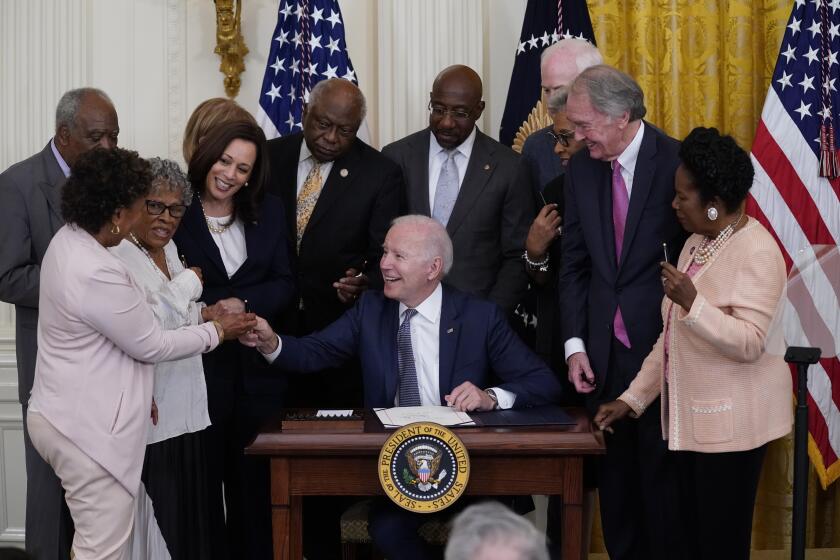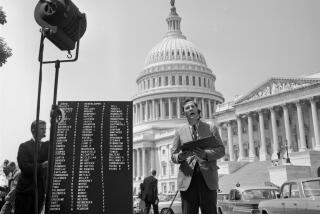Op-Ed: Without a U.S. plan for reparations, Juneteenth is a hollow national holiday

Sorry, America. There are better ways to commemorate the end of slavery than establishing Juneteenth, which is also known as Emancipation Day, as a federal holiday. It perpetuates the falsehood that June 19, 1865, marked the end of slavery in the U.S.
The new Juneteenth National Independence Day, signed into law Thursday, is a missed opportunity for the federal government to acknowledge all that was taken from Black Americans. What Juneteenth really marks is a moment when America started down a road toward racial justice before abruptly executing an about-turn.
Frederick Douglass, the great champion of abolition, celebrated Emancipation Day on Aug. 1, the day in 1834 when Britain enacted a sweeping proclamation freeing all slaves in the British Empire.
Douglass knew then what most Americans, Black and white, have long since forgotten: The Emancipation Proclamation, signed in September 1862, did not free a single slave under Abraham Lincolnâs control. Douglass lamented that while the first Juneteenth was celebrated in Texas, the U.S. government was busy reneging on a sweeping promise of racial equity made to newly freed slaves.
Lincoln made it clear that ending slavery was not his goal. Months before he signed the Emancipation Proclamation, he wrote New York Tribune editor Horace Greeley, âMy paramount object in this struggle is to save the Union, and is not either to save or to destroy slavery.â
A close reading of the proclamation shows it only freed slaves in Confederate states, which never recognized Lincolnâs authority anyway. While former slaves in Texas celebrated their freedom, slavery was still legal in Delaware, which President Biden represented in the Senate for many years â and where enslaved men and women had to await the ratification of the 13th Amendment on Dec. 6, 1865, for their freedom.
British newspapers pointed out the duplicity. The London Spectator, in October 1862, castigated Lincoln and the proclamation as âhalf consciously pressing along a road which ends in emancipation,â then pointed out that the âprinciple asserted is not that a human being cannot justly own another but that he cannot own him unless he is loyal to the United States.â
Disheartened by Lincolnâs timidity, Douglass and most other abolitionists continued to observe Emancipation Day on Aug. 1 throughout the 19th century.
The Emancipation Proclamation contained no real plan for the millions of newly freed men and women other than suggesting that they find jobs or join the Union Army â and abstain from violence. Union Gen. William Tecumseh Sherman and Secretary of War Edwin M. Stanton consulted with Black ministers on Jan.12, 1865, at Shermanâs headquarters in Savannah, Ga. Out of that meeting came Special Field Orders No. 15, popularly known as â40 acres and a mule,â a promise to provide reparations to formerly enslaved Americans that Lincoln ultimately approved.
Biden signs legislation making June 19, or Juneteenth, the 12th federal holiday. The day commemorates the end of slavery in this country.
Special Field Orders No. 15 was simple and breathtaking: Confiscate prime agricultural land from former slaveholders and give every adult freedman about 40 acres. Formerly enslaved men and women could grow crops and establish their own communities. Nearly 1 million acres of Southern coastal land was to be reallocated in a huge transfer of wealth from enslavers to the formerly enslaved.
The plan âwould have created a democratic infrastructure that would have changed the course of American democracy,â wrote historian Lerone Bennett. It also would have likely created wealth within Black families, possibly and significantly closing the âincome gapâ between Black and white families seen today.
By the first Juneteenth in 1865, some 40,000 Black men and women were living on, and farming, land allocated to them by the U.S. government. But Lincoln had been assassinated two months before, and the new president, Andrew Johnson, had already rescinded the special field orders.
It took time for word of the rescission to reach formerly enslaved Black men and women. On Edisto Island, S.C., Gen. Oliver Otis Howard , head of the Freedmenâs Bureau, delivered the news. Before he finished, one old African woman reportedly raised her voice in an island version of a Black spiritual, âNobody Knows de Trouble Iâve Had.â Howard is said to have broken down and sobbed.
As if to plunge the knife of injustice deeper, Sherman wrote Johnson that Special Field Orders No. 15 had merely been a ruse. Sherman had not actually given newly freed slaves full title to their 40 acres. He only wanted them to believe they possessed the land until a victorious North could determine what to do with them. The U.S. has established a national holiday heavy with the baggage of racial injustice â a holiday that does not mark the end of slavery, but a retreat from truth and reconciliation.
To truly celebrate Juneteenth, Congress should revive Special Field Orders No. 15. Dust off the original plans for the acreage to be redistributed to former slaves. Assess the current value of that land, likely in the billions or trillions of dollars. Use that assessed value as the starting point of a reparation plan for Black Americans. Vote that plan into effect on Juneteenth. Then, America will have a worthy holiday.
Clyde W. Fordâs latest book is the forthcoming âOf Blood and Sweat: Black Lives, and the Making of White Power and Wealth.â
More to Read
A cure for the common opinion
Get thought-provoking perspectives with our weekly newsletter.
You may occasionally receive promotional content from the Los Angeles Times.











